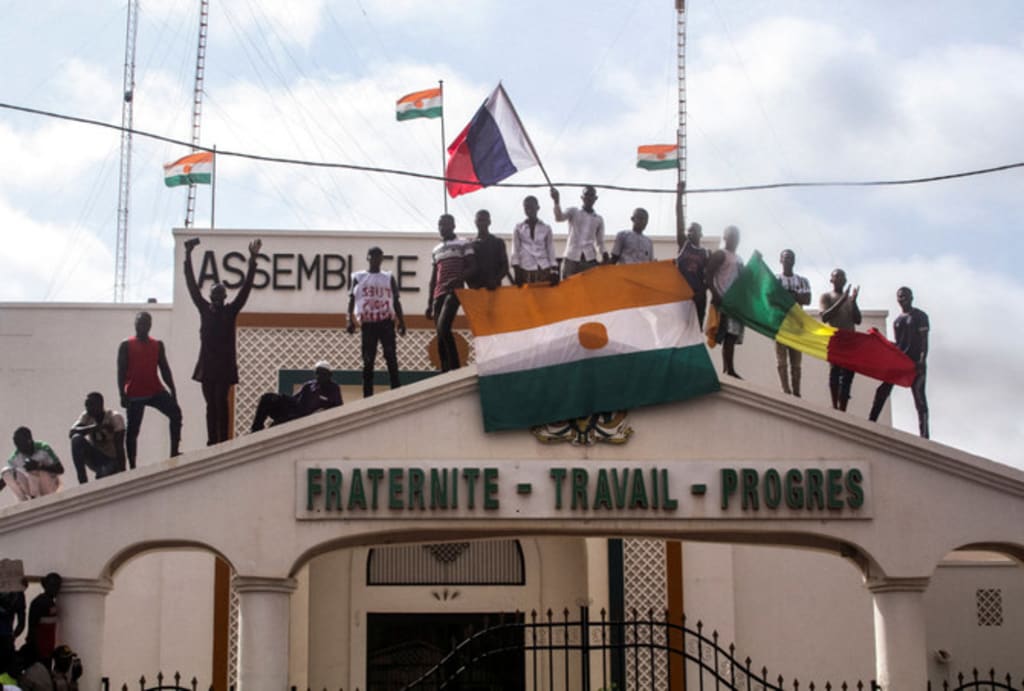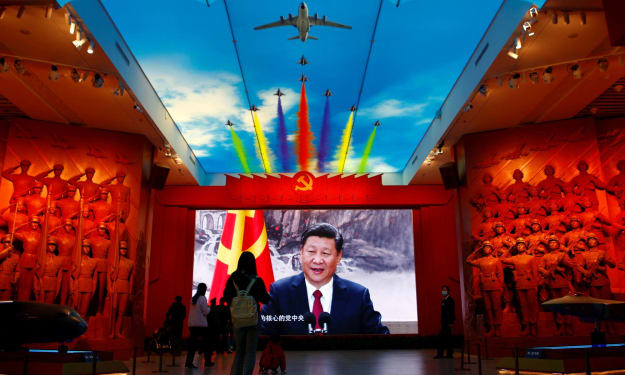
In one of the world's most unstable nations, Niger, an apparent coup attempt has been made by a group of soldiers, claiming to have removed President Mohamed Bazoum from power. This dramatic development unfolded in the capital, Niamey, where armed troops blockaded the presidential palace.
On national television, Colonel Amadou Abdramane, flanked by nine officers wearing fatigues, stated that the defence and security forces had decided to put an end to the current regime due to the deteriorating security situation and bad governance. The soldiers declared the closure of the country's borders and suspension of all republic institutions, along with announcing a national curfew. They also warned against any foreign intervention.
Although the president had been detained, reports indicated that he was safe and well. However, the situation remains fluid as the wider army and national guard challenged the elite guard force's actions and threatened to attack if they did not step down.
In response to the unfolding situation, the US expressed unwavering support for President Bazoum as the democratically elected leader of Niger. They emphasized that the strong US economic and security partnership with the country depended on the continuation of democratic governance and respect for the rule of law and human rights.
The African Union Commission and the Economic Community of West African States (Ecowas) both condemned the attempted coup, emphasizing the importance of upholding legitimate authority and democratic governance in Niger and the wider region.
Niger, a nation facing significant challenges, is grappling with a cycle of deadly violence and jihadist campaigns. With a majority desert landscape and a growing population, the country's human development index remains low. Niger's military has received training and support from the US and France, both of which have military bases in the country.
This is not the first time Niger has faced attempted coups; previous incidents occurred in 2010, 2021, and 2022. The current situation raises concerns about political stability and regional security. As the international community closely watches events unfold, the focus remains on supporting democratic governance, preventing further instability, and safeguarding the well-being of Niger's citizens.
The unfolding situation in Niger has raised significant concerns both within the country and on the international stage. The attempted coup reflects the complex challenges that the nation faces, including security issues, political instability, and social and economic struggles.
Niger, located in the Sahel region of West Africa, has been grappling with multiple security threats. Two jihadist campaigns have caused turmoil in the country, with one spilling over from neighboring Mali in 2015, and the other involving jihadists based in northeastern Nigeria. The persistent violence has led to a deteriorating security situation and significant challenges in maintaining law and order.
Additionally, the nation's human development index remains low, highlighting ongoing social and economic challenges. A rapidly growing population, paired with limited access to basic services and infrastructure, has further strained the country's resources and governance capacity.
President Mohamed Bazoum, who was democratically elected in 2021, has been facing considerable pressures in addressing these multifaceted challenges. His close alliance with France and the support from international partners have been instrumental in navigating the difficult circumstances.
However, the recent attempted coup, which marks the latest in a series of similar incidents in Niger's recent history, underscores the fragility of political stability in the country. The coup attempt was reportedly led by the head of a regional political and security group, further highlighting the complexities of the situation.
The international community has expressed its concern and offered support to President Bazoum and democratic governance in Niger. Both the United States and the African Union have called for the immediate release of the president and emphasized the need to protect constitutional order. Ecowas has also pledged to uphold legitimate authority and democracy in the region.
As the situation remains fluid, it is crucial for all stakeholders to exercise restraint and seek peaceful solutions. Niger's future stability and prosperity depend on finding common ground among different political actors and addressing the root causes of its challenges.
One of the key factors contributing to the instability in Niger is the presence of armed extremist groups in the region. The jihadist campaigns have posed significant threats to security and civilian populations. In response to these challenges, the Nigerien military has received training and logistical support from the United States and France. However, addressing the underlying causes of extremism, such as social and economic disparities and governance deficits, will be essential in ensuring long-term stability.
Moreover, the issue of governance and transparency needs to be addressed to build public trust and confidence. Good governance, respect for the rule of law, and accountability are critical for the stability and development of the nation. Leaders must work together to strengthen democratic institutions and create an inclusive political environment that addresses the concerns of all citizens.
The international community, particularly regional organizations and neighboring countries, can play a significant role in supporting Niger's efforts to overcome its challenges. Diplomatic engagement, mediation, and humanitarian assistance are essential tools to foster dialogue and find peaceful resolutions to conflicts.
Additionally, addressing the socioeconomic issues that contribute to instability is crucial. Efforts to improve access to education, healthcare, and economic opportunities can contribute to reducing the appeal of extremism and violence.
The attempted coup in Niger serves as a stark reminder of the fragility of democratic governance and the need for continuous efforts to build resilience against internal and external threats. As the nation navigates through these challenges, the international community must remain vigilant and steadfast in its support for democratic values, human rights, and peace in Niger and the broader Sahel region. Only through concerted and collaborative efforts can the nation forge a path towards a more stable and prosperous future.
About the Creator
Suganthan
Hi world! I am from Wonder of Asia Srilankan. Happy to write stories and History blog.






Comments
There are no comments for this story
Be the first to respond and start the conversation.